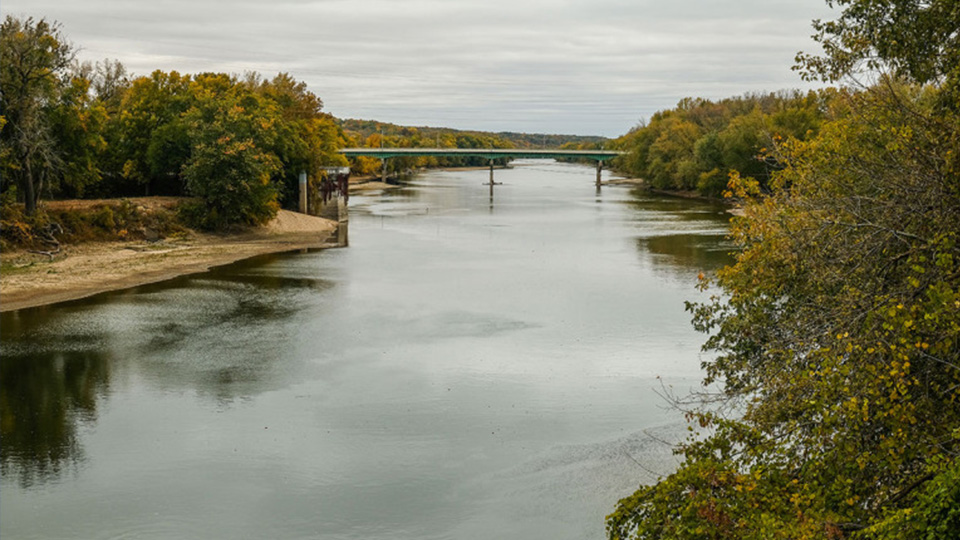In defiance of IEDC, Tippecanoe County passes ban on large water withdrawals
Subscriber Benefit
As a subscriber you can listen to articles at work, in the car, or while you work out. Subscribe Now
Tippecanoe County Commissioners voted unanimously Monday to institute a nine-month moratorium on high-capacity water withdrawals and transfers, a direct rebuke of a state proposal to pump water from aquifers connected to the Wabash River and transport it to Boone County for a high-tech manufacturing district.
The move comes as the Indiana Economic Development Corp., the state’s quasi-public job creation agency, faces pushback for its exploration of a plan to pump as many as 100 million gallons of water per day from aquifers connected to the Wabash River. The water would then be piped to Boone County to support advanced manufacturing developments at the LEAP Innovation and Research District near Lebanon. The IEDC is the agency overseeing LEAP, which stands for Limitless Exploration/Advanced Pace.
The ordinance bans large water withdrawals and gives the county the ability to order a work stop notice and levy a fine of up to $2,500 for each day that high-volume water withdrawals occur.
But whether the ordinance has any teeth remains to be seen.
Doug Masson, attorney for the commissioners, said the county has general authority under home rule to regulate excavation, drilling and water courses. He noted, however, that the Indiana General Assembly in 2012 removed aquifers from the definition of water courses.
“It’s a little ambiguous whether they’ve regulated this activity yet,” Masson said.
The ordinance is intended as a stopgap measure until the 2024 legislative session, when state lawmakers will consider tougher water regulations.
In a statement sent to IBJ, the IEDC said the commissioners’ ordinance is moot because there has been no plan to start moving water within the next nine months.
“This action has zero practicality and was moot from its introduction. The only thing occurring in the area is testing to gather data around water capacity,” the statement said. “There has never been a scenario in which water would be pumped in the next nine months. Thus, this was a clear action to stoke further rhetoric and misinformation.”
The IEDC previously contracted with Texas-based environmental and water resource consulting firm Intera to drill test wells and conduct aquifer pumping tests on a 70-acre area above the Wabash Alluvial Aquifer. While engineers report promising early test results, some residents and independent hydrologists in Tippecanoe County remain dubious of the study’s claims.
During the crowded public meeting Monday morning, some of the nearly two dozen residents who spoke expressing concern about the IEDC’s proposal said those pumping tests along the Wabash created issues with their wells, while others feared the long-term impacts the project would have on the region’s water supply.
“We need to question these tests and understand these tests and make sure we have an independent third party, preferably local hydrologists, who actually specialize in this,” said Sandra Alvillar, president of Stop the Water Steal, a grassroots group formed in opposition to the project. “Surface water specialists have been speaking out in public, and that’s wonderful and part of the equation, but we also need hydrologists.”
Meanwhile, a bipartisan group of state legislators from the Lafayette area is drafting legislation that would require groundwater withdrawals of at least 10 million gallons of water per day—that is then transported to a destination beyond the aquifer surface area—to receive prior approval through a permitting process regulated by the Department of Natural Resources.
Under the legislation, large withdrawals would also require public hearings and written feasibility studies that would have to be peer-reviewed by an expert in water resource hydrology, with the Natural Resources Commission becoming the permitting authority.
If lawmakers choose not to pass legislation, then the county can argue that the state has “acquiesced” to the county commissioners, which would strengthen the legal standing of the commissioners’ moratorium, Masson said.
Two state Democratic lawmakers from the Lafayette region issued statements Monday commending the moratorium.
“This ordinance buys our community something we desperately need – time,” said Rep. Chris Campbell, D-Lafayette, in a statement. “The IEDC has purposely rushed this water transfer proposal since the beginning.”
The Tippecanoe County ordinance gives lawmakers “breathing room” to assure that there’s unbiased oversight and proper water protections, she added.
Rep. Sheila Klinker, D-Lafayette, said that local officials from both political parties have expressed opposition to the LEAP water transfer.
“We’ve all shared our concerns, called for more transparency, more information and an independent third-party study,” Klinker said. “I’m very pleased that this process is going to be slowed which allows more time to discuss the next best steps for our communities.”
The commissioners are the first local government entity to take official action to slow down the pipeline. Previously, the cities of Attica, Lafayette and West Lafayette previously passed symbolic resolutions opposing the pipeline.
With concerns over the potential water pipeline rising, Gov. Eric Holcomb last week decided to shift oversight of Intera’s water study from the IEDC to the Indiana Finance Authority, which has conducted three regional water studies since 2017.
In addition to overseeing state-related debt payments, the IFA manages the Wastewater and Drinking Water State Revolving Fund Loan programs and the Indiana Brownfields Program, which assists in the redevelopment of former industrial or commercial sites.
Holcomb also directed the IFA to accelerate the start of a planned comprehensive regional water study for north-central Indiana that will examine watersheds covering Tippecanoe County and at least 12 other counties. That study is expected to be completed in fall 2024.
IFA members include the state budget director, the state treasurer and three other members appointed by the governor.
IEDC officials have said the pipeline would also serve as a long-term water solution in central Indiana, which is projected to have water shortages in the coming decades, according to previous studies.
